The 2020 Mac Mini Unleashed: Putting Apple Silicon M1 To The Test
by Andrei Frumusanu on November 17, 2020 9:00 AM ESTBenchmarks: Whatever Is Available
As we’ve had very little time with the Mac mini, and the fact that this not only is a macOS system, but a new Arm64-based macOS system, our usual benchmark choices that we tend to use aren’t really available to us. We’ve made due with a assortment of available tests at the time of the launch to give us a rough idea of the performance:
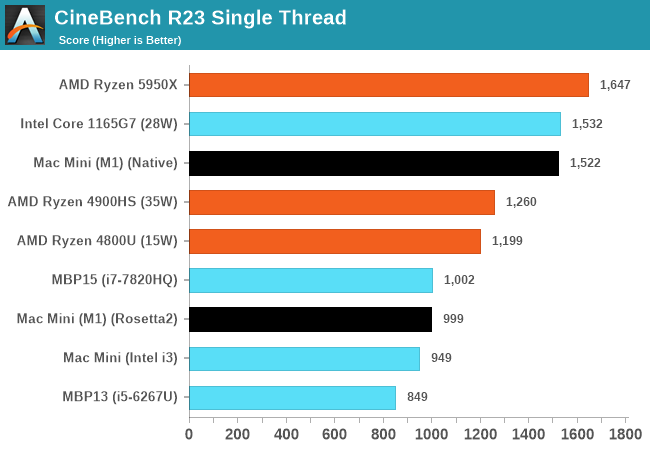
One particular benchmark that sees the first light of day on macOS as well as Apple Silicon is Cinebench. In this first-time view of the popular Cinema4D based benchmark, we see the Apple M1 toe-to-toe with the best-performing x86 CPUs on the market, vastly outperforming past Apple iterations of Intel silicon. The M1 here loses out to Zen3 and Tiger Lake CPUs, which still seem to have an advantage, although we’re not sure of the microarchitectural characteristics of the new benchmark.
What’s notable is the performance of the Rosetta2 run of the benchmark when in x86 mode, which is not only able to keep up with past Mac iterations but still also beat them.
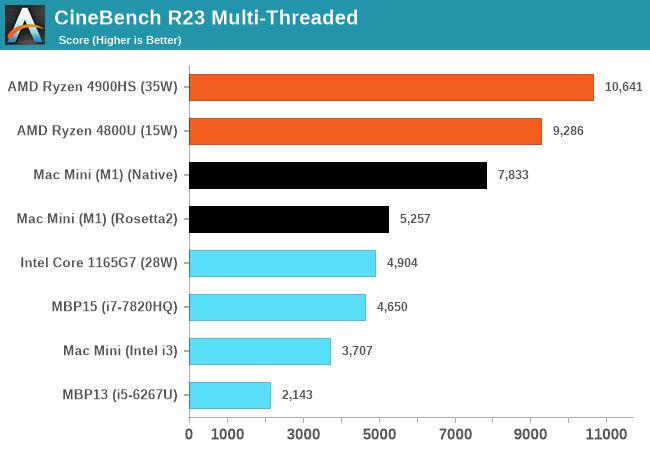
In the multi-threaded R23 runs, the M1 absolutely dominates past Macs with similar low-power CPUs. Just as of note, we’re trying to gather more data on other systems as we have access to them, and expand the graph in further updates of the article past publishing.
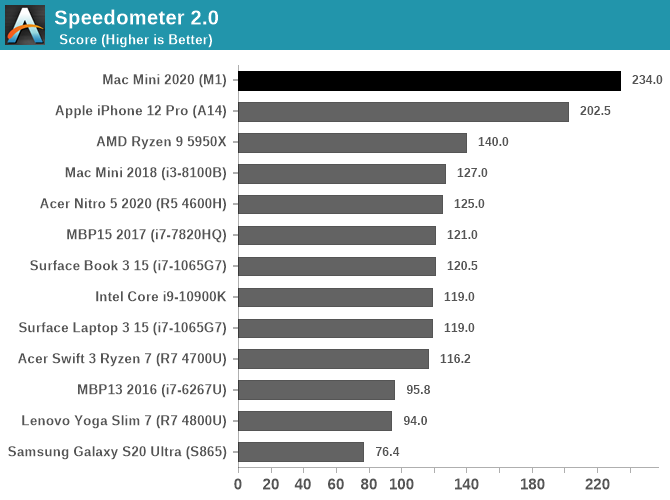
In browser-benchmarks we’ve known Apple’s CPUs to very much dominate across the landscape, but there were doubts as to whether this was due to the CPUs themselves in the iPhone or rather just the browsers and browser engines. Now running on macOS and desktop Safari, being able to compare data to other Intel Mac systems, we can come to the conclusion that the performance advantage is due to Apple’s CPU designs.
Web-browsing performance seems to be an extremely high priority for Apple’s CPU, and this makes sense as it’s the killer workload for mobile SoCs and the workload that one uses the most in everyday life.
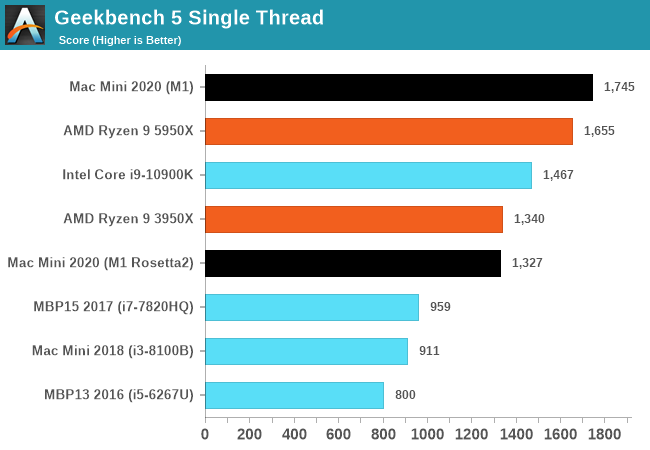
In Geekbench 5, the M1 does again extremely well as it actually takes the lead in our performance figures. Even when running in x86 compatibility mode, the M1 is able to match the top single-threaded performance of last generation’s high-end CPUs, and vastly exceed that of past iterations of the Mac mini and past Macbooks.
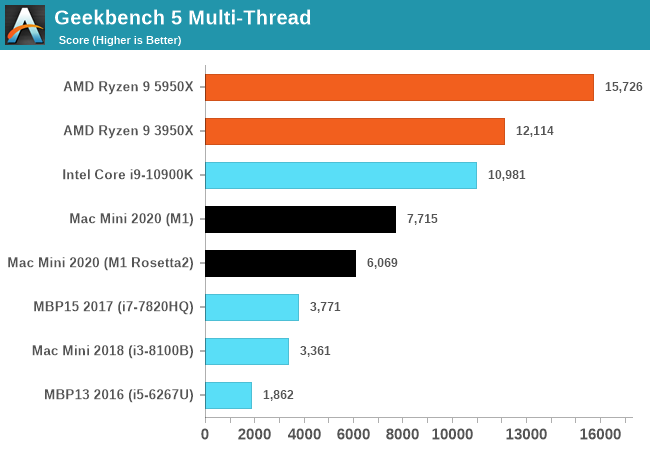
Multi-threaded performance is a matter of core-count and power efficiency of a design. The M1 here demolishes a 2017 15-inch Macbook Pro with an Intel i7-7820HQ with 4 cores and 8 threads, posting over double the score. We’ll be adding more data-points as we collect them.


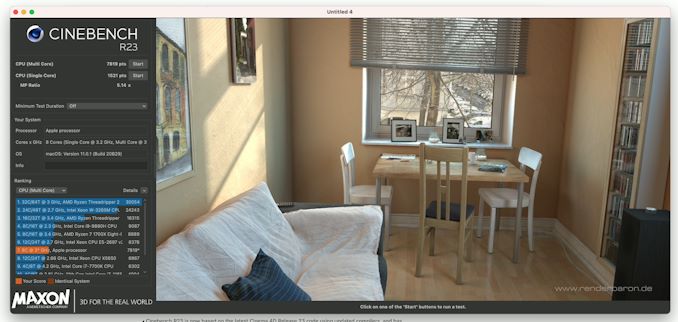








682 Comments
View All Comments
tkSteveFOX - Friday, November 20, 2020 - link
Just imagine if they up the TDP to 40W on the next 3nm process next year?Perhaps the CPU part won't get big gains (let's face it, CPU is better than anything on the market up to 60W), but GPU should double the performance. By that time 95% of apps will be native as well, so M1 performance will gain another 10-20% additional performance in all scenarios.
mdriftmeyer - Saturday, November 21, 2020 - link
GPU double performance. That's delusional right there. Nothing in Apple's licensed IP will ever touch AMD GPU performance moving forward. Your claim the CPU is better than anything on the market up to 60W is also delusional.Enjoy 2021 when very little changes inside the M Series but AMD keeps moving forward. Being a NeXT/Apple alum I was hoping my former colleagues were wiser and moved to AMD three years ago and pushed back this ARM jump two more years.
ARM has reached its zenith in designs in the embedded space and that is the reason everything wowed is about Camera Lenses. Fab processes are reaching their zenith as well.
M1 is 12 years of ARM development by Apple's teams after buying PA Semi in 2008. It took 12 years with unlimited budgets to produce the M1. It's far less impressive than people realize.
Most of Apple's frameworks are already fully optimized after the past 8 years of in-house development. People keep thinking this code base is young. It's not. It's mature. We never released anything young back at NeXT or Apple Engineering. That hasn't change since I left. It's the mantra from day 1.
The architecture teams at AMD have decades more experience in CPU designs and nothing released here is something they haven't already worked on in-house.
Intel's arrogance is one of the greatest falls from the top in computing history. And it's only going to get worse for the next five years.
dontlistentome - Saturday, November 21, 2020 - link
Not sure when Intel will learn - they let the Gigahertz marketeers ruin them last time AMD had a lead, and this time it was the accountants. Wondering who screws them up again 15 years from now?corinthos - Monday, November 23, 2020 - link
Intel made so many mistakes and brought in outsiders who just didn't have the goods to set it on a good path forward. The board members who chose these folks are partially to blame. Larrabee was just one of the earlier warning signs.corinthos - Monday, November 23, 2020 - link
So are you saying that there's more limited growth opportunity for Apple going down the ARM path than people realize, and that the prospect of AMD producing competitive/superior low-powered processors is going to be much better?For now, it seems that for the power consumed, the M1 products have a leg up in power-performance over Intel or AMD-based competing products. Can Apple take that and scale it upwards to be competitive or even a leader in the desktop space?
I think about how there are some test results coming in already showing how a 2019 Mac Pro with a 10-core cpu and expensive discrete amd gpu and loads of ram being outshined by these M1's in some video editing workloads and wonder if a powerhouse desktop is such a good investment these days. That thing came out like a year ago and cost probably around $10K.
Focher - Tuesday, November 24, 2020 - link
From your post, I suspect you are not going to enjoy the next 2 years. Saying things like the code is already fully optimized is so ridiculous on its face, it’s hard to believe someone wrote it. If time led to full optimization, then what’s the magic time horizon where that happens? If you think Apple just played its full hand with the M1, you’ve never paid attention to Apple.blackcrayon - Tuesday, November 24, 2020 - link
I would think doubling GPU performance would be one of the easier updates they could make. More cores, more transistors with their existing design - the same thing they've done year after year to make "X" versions of their iPhone chips for the iPad. The M1 isn't at the point where doubling the GPU cores would make it gigantic and unsuitable for a higher end laptop or desktop. Unless you thought he meant "double Nvidia's best performance" or something which isn't going to be possible currently :)zodiacfml - Friday, November 20, 2020 - link
Coming back here just to leave a comment though the M1 truly leaves any previous Apple x86 product in the dust, it is far from the performance of a Ryzen 4800U which has TDP of 15W. The M1 is at 5nm while consuming 20-24W.The M1 iGPU is mighty though, which can only be equaled or beaten by next year/generation APU or Intel iGPU
thunng8 - Saturday, November 21, 2020 - link
The 4800u uses up to 50w running benchmarks and under load. You will never see a current gen Ryzen without active cooling. In laptops running benchmarks, the fans ramps up to 6000rpm while the m1 can run in the MacBook Air with no cooling with hardly any performance degradation. And there’s also the issue of battery life where the m1 laptop with a smaller battery can far outlast any Ryzen laptop.In short you cannot compare intel and AMDs dubious tdp numbers with the number measured for the m1.
BushLin - Saturday, November 21, 2020 - link
M1 and 4800U (in 15W mode) are consuming similar 22-24W power when the 4800U is showing better Cinebench performance, no denying the single thread advantage of the M1 though.If you've seen a 4800U anywhere near 50W, it won't have been in its 15W mode and running an unrealistic test like Prime95.
Just the facts Jack.